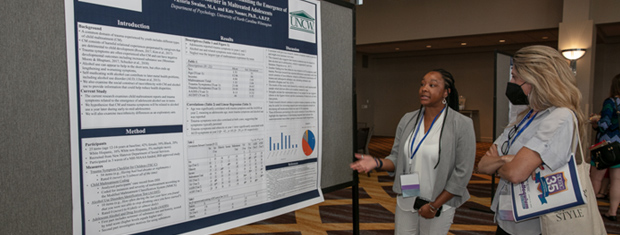




The APSAC Advisor is a peer reviewed quarterly news journal for professionals in the field of child abuse and neglect.
The APSAC Advisor provides succinct, data-based, practice-oriented articles that keep interdisciplinary professionals
informed of the latest developments in policy and practice the field of child maltreatment. It is designed to highlight
best practices in the field and publish original articles and current information about child maltreatment for professionals
from a variety of backgrounds including medicine, law, law enforcement, social work, child protective services, psychology,
public health and prevention in the U.S.
 If you wish to learn more about submitting an article to the Advisor, please click here.
If you wish to learn more about submitting an article to the Advisor, please click here.
This library contains Advisor issues dating back to the first issue in 1988. The most recent issue appears at the top.
Scroll down to select past issues by year and issue number. Once a publication appears in the box, you
can use the Enlarge button to open the document in a new window or tab (depending on how your browser is set up).
This will allow you to view the document with larger print.
To print a document, first use the Enlarge button to open the document in a new window or tab. Then use your browser's Print command.
To return here from a new tab, close the tab. To return from a new window, click your browser's Back button.
In the listing below, click on a year and issue number to see the articles in that publication.
2017 Number 1
Corporal punishment (CP), also called physical punishment, of children is used by the majority of U.S. parents and is legal in public schools in 19 states and in private schools in 48 states. This introduction to the APSAC Advisor provides an overview of the issue of CP in the United States. Research strongly supports APSAC’s position statement calling for an end to CP in any circumstances. Other organizations concerned with the welfare of children should follow APSAC’s lead and issue statements against the use of any CP or physical discipline of children.
APSAC Members’ Responses to a Survey of Attitudes & Beliefs About Corporal Punishment
We conducted a survey of the APSAC membership to examine their attitudes, beliefs, and training needs in the area of corporal punishment (CP), also called physical punishment, of children. Fifty-one percent (51%) of the APSAC membership responded to this one-time online survey. The majority of respondents did not condone the use of CP. Results suggested that child welfare professionals may benefit from greater training on how to address the topic of CP with parents, particularly with regard to cultural sensitivity.
APSAC’s Position on Corporal Punishment
APSAC’s Position on Corporal Punishment
Corporal Punishment in Schools
Despite the well-documented negative consequences of corporal punishment, it is still legal in public schools in 19 states and in private schools in all but two states. Over 100,000 students received physical punishment during the 2013-2014 school year alone. Among students, corporal punishment in school is disproportionately administered to boys, disabled students, and minority students. Today, there is growing support to end CP in schools from policy makers such as U.S. Secretary of Education John B. King Jr., agencies such as the National Women’s Law Center, educators, and the general public.
Corporal Punishment: Evaluation of an Intervention by PNPs
The study evaluated learner attitude toward corporal punishment (CP) before and after the implementation of a pediatric nurse practitioner (PNP)-designed educational intervention and influences upon learner attitude and beliefs about CP. The study used a pre- and post-survey design to assess learner attitude about CP before and after participation in an educational intervention. Results suggest that pediatric health car providers, including nurses and PNPs, need education on child discipline and CP.
Corporal Punishment of Children & Human Rights: Welcoming Children to the Family of Humanity
With the adoption of the Convention on the Rights of the Child (CRC) in 1989 and its ratification by all United Nation member nations except the United States, obligations have been placed on adults to respect children’s physical integrity and human dignity. The Committee on the Rights of the Child, which monitors the implementation of the CRC, has made clear that corporal punishment of children in any context (family, school, juvenile justice) is violence and a violation of Articles 37 and 19 of the CRC. Seeing corporal punishment through the lens of human rights reminds adults to stop isolating children and connects adults to their own childhoods.
The Dane County District Attorney's Office's Child Abuse Initiative was designed to address use of corporal punishment by caregivers within our community. The intent was initially to expand and enhance diversion programming for caregivers referred for criminal charges related to physical abuse of a child. The initiative expanded to include focused community engagement efforts through conferences addressing the cultural context of corporal punishment, development of the first governmental No Hit Zone, and dialogues on this topic in the surrounding community and nationally. Staff members continually review and augment the initiative while working to promote efforts to eliminate corporal punishment.
Shaping Child Welfare Practices in America & Abroad
The President and CEO of the New York Foundling organization outlines a vision for the future of child welfare across the globe.
Legislation Alone May Not Be Enough to Encourage Public Reporting of Suspected Child Maltreatment
Nineteen U.S. states have enacted legislation requiring universal mandatory reporting of suspected child maltreatment. Through examining public knowledge of child abuse reporting laws in New Hampshire, a state that has adopted universal mandated reporting laws, this study, authored by Dr. Wendy A. Walsh and Dr. Lisa M. Jones and published in the Journal of Public Child Welfare, serves as an important reminder that the existence of universal reporting laws does not guarantee that the public is aware of or influenced by them. Implementation science can offer important lessons; robust legislation needs to be coupled with efforts to promote awareness and ensure that the public knows how to use the mechanisms put into place by the laws.
APSAC Advisor 29(1): Full Issue